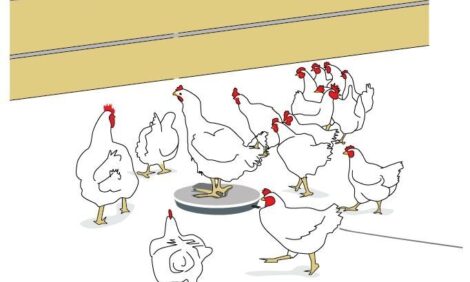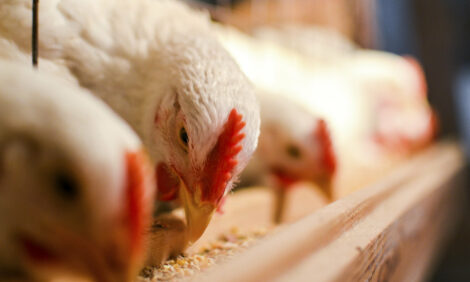



Importance of R&D for the Future of the UK Poultry Industry
Dr Murdo MacLeod has presented his Temperton Fellowship Report entitled The Importance of Research and Development on Supporting a Future UK Role in an Expanding Global Poultry Industry. The highlights of his report are summarised by Jackie Linden for ThePoultrySite.The seventeenth report in the Temperton Fellowship series supported by Harper Adam University College was prepared by Dr Murdo MacLeod of the Roslin Institute in Scotland. Presenting his findings at a meeting in London recently, he explained that the content had been informed largely by the responses to a questionnaire sent to representatives of about 40 poultry-related companies. It also includes some of the author's personal opinions.
Poultry Has Potential to Alleviate Global Challenges
Dr MacLeod explained that we should be positive about what the poultry industry has to offer in helping to solve some of today's most pressing problems – climate change, the environment and human population growth. Although the industry has been on the defensive over a number of issues, objective analysis shows that poultry meat and egg production have important advantages over other ways of producing animal protein.
It is time to publicise to consumers some of these positive aspects of the poultry industry. This should include scientific data showing that poultry products have less impact on carbon, nitrogen and energy than other forms of animal agriculture. The high fecundity of poultry and the short generation time mean that production is inherently sustainable, and poultry products offer realistic and rapid-response high quality protein for a growing global population.
Key Topics for Current and Future Research
The genetic improvement of inherently efficient poultry species has been and still is produced by conventional genetic selection, Dr MacLeod said.
According to breeding company geneticists, this will be enhanced but not replaced by detailed knowledge of avian genetics at the molecular level. Such studies can contribute to selection for increased disease resistance – in terms of general innate immunity and against specific pathogens – with the further advantage of reducing the need for chemical and vaccine interventions.
Dr MacLeod emphasised, however, that the industry also needs and values research on less fashionable topics such as nutrition, as feed makes the biggest contribution to overall production costs.
Choices for Placing Research Contracts
Industry respondents to the questionnaire indicated that 'quality' was a major strength of UK scientific research. Many, however, stated that their companies carry out research in other countries. Cost was cited as the main reason.
Dr MacLeod illustrated these trends by explaining that in the past five years, twice as many scientific papers have been submitted from China as from the UK to the journal, British Poultry Science. However, as the result of perceived scientific quality or novelty, acceptance rates for papers of Chinese and UK origin were 34 and 74 per cent, respectively.
He suggests that the difference in research costs is likely to be related more to costing methods rather than scientific salaries. Most institutes and universities in the UK apply full economic costing to research projects.
Responses to the questionnaire indicate no overwhelming preference by companies to select a particular type of research establishment, e.g. institute or university. However, the replies indicated concerns over the diminishing number of UK locations with breadth across a suitable range of disciplines. There appeared to be no problem mobilising scientific effort rapidly where both scientists and resources are available.
Next Generation of Researchers
The questionnaire highlighted concerns over the increasing average age of remaining scientists in practically important disciplines such as nutrition and the absence of obvious successors, Dr MacLeod reported.
The shortage of young people specialising in poultry science in the UK may be attributed to negative perceptions of the industry. Dr MacLeod suggested that promoting the image of poultry production as an environmentally sustainable contributor to world food needs should help attract new recruits into the sector.
He also sees opportunities for UK scientists in providing scientific background to global and quality standards. The EU is a large market and suppliers to that market must meet high standards of production and quality.
Young scientists are also attracted into areas such as genetics and genomics, where poultry constitute an important animal model. Such researchers will then be an important resource for the breeding industry.
Finally, Dr MacLeod sees a need for UK consumers to be informed so that they understand the value of identifiable and traceable UK products that are produced to known standards.
Funding of Research
On the subject of research finding, Dr MacLeod stated that reliable government support for strategic research is essential. He added the example of Australia, where the industry runs a levy system to support specific areas of research. This has led to the development of broad-based poultry research guaranteed to be responsive to industry needs.
The maintenance of active national infrastructure for poultry research and education has the potential to maintain or even enhance the position of UK companies in key sectors of the global industry, Dr MacLeod concluded.
Copies of Dr MacLeod's full report can be obtained from the Office Services Manager, Harper Adams University College, Newport, Shropshire TF10 8NB, UK, at a cost of £15 per copy.
August 2009











